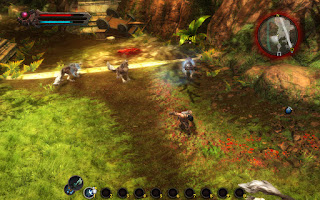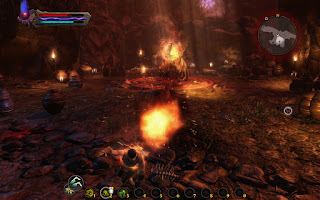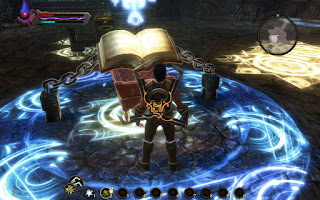Release Date: February 12th, 2012
Platforms: PC, PS3
Score: 9/10
Similar Titles: Mass effect, Skyrim, Dragon Age, Witcher
 |
| Title cover. |
After briefly reading about Kingdoms of Amalur and discovering none of my friends knew anything about it, I decided to take a chance. Big Huge games and 38 Studios didn't let me down. Although Amalur doesn't introduce anything particularly groundbreaking or original, it successfully implements some of the best mechanics of all your favourite RPG games.
 |
| Fighting is about mobility and dodging. |
What you will find is a fluid mouse based combat system with spells and abilities that you will recognise. Everything will be within your comfort zone, executed with a graceful polish. For example: when you level up you obtain separate points for adventuring skills and combat abilities.
 |
| Spells can be cast flawlessly during combos. |
We all know in the present the gaming industry has a nasty habit of regurgitating content shamelessly. Why risk going for something new when what you have is still raking in the customers? Kingdoms of Amalur is no different. The mechanics are derived and improved from franchises like the Elder Scrolls, Dragon Age, and even popular MMORPG games. Although it is nice to have game with such polish on the market, I am a little disappointed Amalur doesn't really go for anything innovative or push any boundaries.
 |
| Picking a race doesn't really make a difference. |
Pretty much everything is delivered to you as expected throughout the game. Upon selecting one of the four races and adapting the generic but satisfying character design; you find your champion rising from the dead and climbing mount corpse. Oh, you have anmesia and absurd weapon proficiency, we all know people who lose their memory are battle hero super warriors. Duh.
 |
| The environments can be beautiful. |
As I hacked my way through the tutorial, I found myself skipping through conversations, a habit that only got more and more frequent with further progression. The majority of the quests are usually action filled and well crafted, but still prone to tedium. I was mostly driven by my eagerness to hit stuff and get that next ability or overpowered item.
 |
| Quests are easy to manage and track. |
Even patient players will be encouraged to put on subtitles and bypass the less interesting dialogue. R.A Salvatore and Todd Mcfarlane composed a great storyline and established the tone of the game, and even though it may be bogged down a little by the questing; they divided the workload giving the developers precious time to work on immersive gameplay.
 |
| Some bosses have epic design. |
Although the game kicks off very quickly and the learning curve practically doesn't exist, therein lies the one major flaw to Amalur. It is beyond easy. Combat is addictive, although the ability to spam healing and mana potions allows you to persevere any assault if you come prepared. Abilities are cool, but half the time you will find a lack of enemies to beat them with. Bosses put up a very challenging fight until you use reckoning mode, giving you enough slow motion time to kill the boss and then some.
 |
| Unloading a reckoning bomb makes everything easy. |
Kingdoms of Amalur still provides a wholesome overall experience. The graphics are very easy on the eyes, but cartoon inspired which might let down those of you who like to see blood. Battle animations are attractive enough to distract you from the repetition of combos you will use.
 |
| Maps are easy to navigate. |
Since your adventure and combat skill points are separate, Blacksmithing, Sagecrafting and Alchemy are all completely optional professions. It is possible to ignore them entirely without it gimping your character. However, all the items in the game are used for something; meaning there isn't much useless trash to unload in the marketplace. Inventory management is refreshing, it isn't a chore which has been an issue in some games (By some, I mean the Witcher).
 |
| Professions can produce some pretty awesome items. |
One of the truly brilliant aspects of Amalur is how lovingly each area is designed. Travelling from one objective to the next is easy with the fast travel and accurate map markers. You won't be sitting around looking for what to do, because every step you take will lead you to something including herbs. Treasure is everywhere in abundance with herbs, and where there is no loot there will be enemies or runestones and herbs. Doing anything grants you some kind of reward; which is far more gratifying than getting lost on Skyrim, without herbs.
 |
| You'll never fight one enemy at a time. |
Despite all the wonders of the game and brilliant polish, I lost my enthusiasm for Kingdoms of Amalur almost as fast as I earned it. There is little need for a second playthrough, since the decisions you make with your first character all seem a little hollow. For example, get crowned as king of the elves- a somewhat prestigious title. Nobody in the world of Amalur even notices your kingship, and nor does it impact the story. With the ability to re-specialise all your ability points there is no point in making a new character when you can just change your old one.
 |
| Every enemy archetype is there, including undead. |
Ultimately, Kingdoms of Amalur: Reckoning is a wonderfully structured game at the forefront of single player RPG titles. The combat engine is impressive for the genre, and you can advance as fast as you feel comfortable with. However, it wantonly discourages you going in for a second playthrough, and the plot is practically doesn't exist until you've reached the end.
 |
| Ogres are piss annoying to deal with. |
I conclude that you will not be wasting your money on this game if you feel finishing it once is enough. I don't think many people will ever complete it twice, it just isn't built that way.

No comments:
Post a Comment